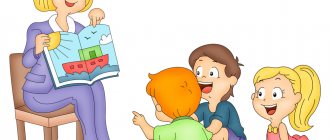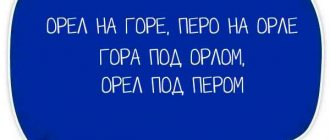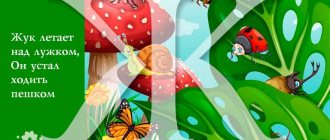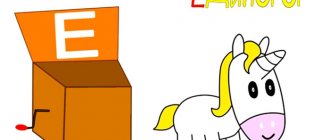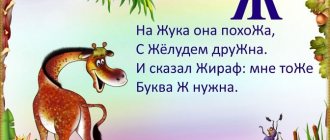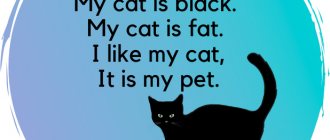How fun it is for children to pronounce tongue twisters! And it’s funny to the point of tears, and speech develops, and incorrect sounds in words begin to be pronounced correctly. Today for you is a selection of tongue twisters starting with the letter “l” for the development of speech and articulation for our children.
The sound “l” is very often pronounced incorrectly by children or not pronounced at all, and is often replaced by other sounds. It will be very useful to practice tongue twisters with your child.
Complex tongue twisters for the letters “r” and “l”
To move on to more complex tongue twisters with the letters “r” and “l”, you need to learn how to pronounce easier ones, in one or two lines.
***
Valery painted the cavalry with watercolors. The quarry cavalry gallops at Valery.
***
Valya was knitting mittens. Varya was knitting felt boots. We bought Valerika and Varenka mittens and felt boots.
***
Valerka took the plate, Valerka took the tray. Valerka brought me a plate on a tray.
***
The fidgety wind tore out the gates like pinwheels, the grumpy raven stole the evening cheesecakes.
***
The crab made a rake for the crab. He handed the rake the crab to the crab. Crab rakes hay.
***
Lara planted cucumbers, and then watered them, and then collected them, washed them and pickled them.
***
Larisa prepared rice soup for Boris. And Boris treated Larisa to Iris.
***
Praskovya traded the crucian carp for three pairs of striped piglets. The piglets ran through the dew, The piglets caught a cold, but not all of them.
***
The pig's snout was blunt. I dug up half the yard with my snout, I dug, I dug, I didn’t get all the way to the fence. That's why the sow hare snouts, so that she can dig.
***
The magpie argued with the crow, chattered, chattered, out-argued the crow.
***
Forty forty stole peas, Forty crows drove away forty, Forty eagles scared away the crows, Forty cows drove away the eagles.
***
Avdey was dragging a bag of nails, Proud was dragging a bag of milk mushrooms. Avdey gave nails to Gordey, Gordey gave milk mushrooms to Avdey.
***
The lop-eared burdock came out into the meadow in the rain, and gathered the wet and chilled passers-by under the leaf into a circle.
***
The children played together in the orchestra: Karl played the black clarinet, Kirill played the horn, Alla played the harp, and Lara played the piano.
Complex tongue twisters with the letter “l”
***
Klava deftly chopped onions, Lola washed the floor and shelves, Volodya knocked out the dust, Valya hammered nails, Kolya merrily sawed, Anatoly washed the forks, and little Sveta ate sweet candies.
***
A white wolf lived in the world, washed his paws clean with soap, was very clean, and howled for a long time without soap.
***
For some reason there was a blanket on our floor. Alla didn’t even see how it got there: she was sculpting, she was knitting, she was walking on the street. The blanket got bored
***
Striped rugs Vlas's daughter rinsed. I rinsed and rinsed - the river became striped.
***
Mila bought a doll and wore it all day. Mila dressed the doll, kissed it, and loved it. She gave the doll a name - she called the doll Galochka. Mila rocked the doll. She sang nicely and nicely: Gala-Gala-Galochka, Here's a jump rope for you, Here's a little box for you, Chocolate and a bun.
***
Lions wandered in cages, Gazelles galloped, Snails crawled, and foxes ran. And only the animals sighed sleepily, sniffled sweetly, and moaned softly.
***
Old talkative women live in a hut at the edge of the forest. Every old lady has a basket, There is a cat in every basket, Cats in baskets sew boots for old ladies.
***
An avalanche of snow slid down from half, slid down from half of a gently sloping mountain. Another half of the snow avalanche lies on the flat mountain for the time being.
How to correctly use tongue twisters for the sound L in the development of speech in preschool children
First rule. The main rule for using tongue twisters in the development of children's speech: the text of the tongue twister that we offer to the child must contain those sounds that the child already knows how to pronounce correctly. In this case, we reinforce the correct pronunciation of the sound l and develop the child’s diction.
If we include in the tongue twister those sounds that the child pronounces incorrectly, then we do not develop the child’s speech, but, on the contrary, we reinforce the incorrect pronunciation of sounds in his speech! Therefore, the correct selection of tongue twisters individually for each child, taking into account the characteristics of his speech development, is so important.
Second rule. An adult carefully observes the child’s pronunciation of the sound L in tongue twisters and corrects the child if necessary.
When a child pronounces a tongue twister, he may make a mistake and begin to pronounce the sound L incorrectly again. In this case, you need to remind him of the correct pronunciation, say the tongue twister more slowly and clearly, syllable by syllable. And then gradually speed up its pace.
Third rule. If ancient words and expressions are found in a tongue twister, then we clarify their meaning in a conversation with the child. For example, in the tongue twister “The ox fell into the wolf’s den,” you need to talk with the child about:
- who is the ox?
- Is he afraid of the wolf and his lair?
- With what intonation is it better to read this tongue twister?
Fourth rule. Tongue twisters are a language game, and a game is always fun and interesting. This is exactly what we do with tongue twisters with the sound L! The list of tasks and games given below will help you.
Which tongue twisters are more difficult?
The complexity of "linguists" is not determined by their size. The difficult combination of sounds makes it complex and difficult to pronounce. For example, the sound “l” in this variation will be more difficult to pronounce:
- The snout pig was white-nosed, blunt-nosed. I dug up half the yard with my snout, dug, dug.
- Karl put onions on the chest, Klara stole onions from the chest.
- The queen and her gentleman were walking around the square. There were no lights on in the park. The gentleman did not want to use foul language in front of the queen.
It is not recommended to give such tongue twisters to children under 8 years of age. They are more suitable for older children and adults.
Rules for the pronunciation of “linguists”
To achieve maximum results from repeating pure phrases, you must adhere to the following rules:
- You must first pronounce the phrases slowly and clearly.
- If we are talking about a child, he must first explain the meaning of the phrase, since it does not always contain understandable words.
- The second time it’s worth saying the phrase faster.
- The third time, say quickly and repeat again.
- For adults, it is not enough to simply strive to speak quickly. You should also change your expression and intonation. Because diction training also includes expressiveness of speech.
You should always start with short sayings. They are easier to remember and pronounce. There is no point in stopping there. After automating the short “tongue rollers,” you can move on to more complex and longer ones. If short phrases are given with ease and without difficulty, this indicates that you are ready to take new steps towards ideal diction.
Tongue twisters starting with "l" and "s" for adults
Adults will also find “tongue wrenches” useful in order to hone their speech and more closely monitor the pronunciation of sounds. This is relevant for presenters, speakers, artists, entertainers. Examples of the most common “linguists”:
- Have the lilies been watered? Or have the lilies withered? (continued: We watered the lilies. We poured everything on the lilies).
- We sank to the poplar! They sank to the poplar! (continuation: They stomped all the way to the poplar, but their feet stomped).
- Klava found a treasure in the well. She put it in the deck and dropped it into the water. (continued: Klava looks into the water: no deck, no treasure).
- Dear Mila loved whitewash.
- We sat down in seven sleighs, seven to a sleigh. (continuation: the seven of us rolled down on a sleigh - and into a snowdrift).
- Senya said to Sanya: we ourselves have a mustache!
For adults, speaking complex phrases quickly is important. This promotes good diction.
Yazykovertkina “l” to help
A speech therapist usually helps. And parents can help consolidate the result with fun and useful tongue twisters or “tongue twisters,” as they were called in the old days. There are many options. This is a practice for the soft “l” sound.
- Wasn’t it you who begged for love, beckoning me into the fog of the estuaries?
- Lyalya loves the doll Lelya. Lyalya is cherishing her doll. Lyalya in Lyulya - and Lyalya sleeps.
- They sawed, they stabbed, they stabbed, they sawed. Lilya with Polina, Polina with Lilya.
- I caught burbot, caught tench, exchanged tench for burbot, and caught burbot, but didn’t catch it.
- La-la-la - the boat has sailed. Li-li-li - Lilya was taken away. Lu-lu-lu - I don’t like to be lazy.
This is training a hard “l” when alternating with a soft “l”:
- Mila loves to wash her with soap, Mila’s mother will give her soap.
- They poured a spoon out of tin. We made a small mistake. The foundry worker Lilya was lazy. Half of the casting was missing.
- Thekla has nice beets. They didn't get dry or wet all summer. And they didn’t fade in winter.
Some children make the sound “l” instead of “r”. And here a well-known tongue twister can come to the rescue, which trains two sounds at once - Karl stole corals from Clara, and Clara stole the clarinet from Karl.
Training the sound “s”
Sometimes instead of the whistling sound “s”, children hear the hissing sound “sh”. More often this occurs due to underdevelopment of the speech apparatus, as well as due to birth injuries. You can correct the position by regular training and honing the “s”. There are a number of useful “tonguage tools” for this:
- Sasha sewed shorts for Sveta. Sveta sewed boots for Sasha.
- Senka brought gifts to the family: earrings for his sisters, boots for his brothers.
- They bought a saber for Sasha. Sasha is sitting with a saber and with his neighbor Sasha. They started playing and broke the checker.
- Sasha is perfection and is still improving herself.
- Sasha sewed a hat for Sasha. Sasha hit a bump with his hat.
- I'm tired of asking to mow in the field. Mill all the braids in millet. Posed millet for the piglets. And the piglets ask for more millet.
- A fidgety neighbor has a stay-at-home neighbor. I was going to sit at home with my fidgety neighbor all day with nothing to do, but the fidgety guy didn’t sit for even a second.
These and similar tongue twisters help to pronounce “s” clearly and in all variations.
Automation of the sound “L” in tongue twistersmaterial on speech development on the topic
Tongue twisters with the sound [l] - One Klim pounded the wedge, pounded and knocked out. “Our Polkan fell into a trap. — Slava ate lard, but there was not enough lard. - Klim threw his bow at Luka. - Polkan pushed the stick with his paw. — The Christmas tree has pins and needles. - Cap - under the cap, under the cap - cap. - Mom washed Mila with soap, Mila didn’t like soap. “Ivan the idiot was chattering milk, but didn’t blurt it out.” “The little chatterbox chattered milk but didn’t blurt it out.” — — The flour-milling goat ground flour for whom and for whom did it not? - From the one to whom he ground, he received pies; From those whom he did not grind, he received blows. — Near the stake there are bells, and on the stakes there are bells. - In the boat - Volodka, in the tent - a shovel. - The ox was white. — The ox fell into the wolf's den. — The sorcerer conjured for a long time in the boat. — Lala was eating halva under the blanket. - Dear darling, Mule was small. — Neil was mopping the floor and whining. — Plato was sailing on a raft. — Volodya drank milk from a bowl. — Slava got up from his chair. — Is there a ball in the flowerbed? Not a ball - a bun. Poems for sound automation [l] * * * A wolf went out hunting, He knows a lot about hunting. And the goat, and the goose, and the heifer were afraid of the evil wolf. * * * The shovel dug, dug, dug, Then she lay down, apparently very tired. * * * A crowbar breaks thick ice, a crowbar never tires of breaking. * * * The saw is sawing a thick trunk, It is white-hot. * * * The cleaver chopped, chopped, chopped, The cleaver split the log. * * * The broom danced and danced around the house, sweeping the floors from corner to corner. * * * The rocking duck laid eggs, the rocking duck hatched children, the rocking duck caught fish. The rocking duck fed the children. And the good drake swam on business, he swam on business - he looked after the children. Olenka What you took, put it back - Olenka knows this. What you took, put it back! Only the girl is small: She forgets where she got it. Z. Alexandrova Summer day There was a blue sky, There was a golden sun, A cat was lying on the porch, A boy was planting a tree. Time passed slowly, It was quiet and warm. V. Danko
A terrible story While finishing a bun with butter, the brothers were walking along the alley. Suddenly, from a back street, a large dog barked loudly at them... D. Kharms * * * Klava was putting the treasure in the deck. The treasure floated away from Klava into the water. Klava did not swim for the treasure, but the deck floated away. * * * Striped rugs Vlas's daughter rinsed. I rinsed and rinsed - the river became striped. * * * The woodpecker lived in an empty oak tree, The oak tree chiseled like a chisel. I hammered for a day, hammered for two, and hit the sky with my beak. * * * Lived a tin soldier. He sang, joked and did not bother. He fought, did not get tired, and fell and got up himself. And he always remembered in battle His soldier family, Where he was for everyone, and every one of them stood for him. * * * The darkness could have swallowed us, But the lamp helped us... Icicle When I ate the icicle, It was very tasty, And then I got sick, It became very sad. M. Druzhinina Resentment Let him cry if someone wants, But I don’t cry - I don’t want to. And I feel bad for those who cry: Through the tears the sun is not visible. R. Sef * * * - White hare, white hare, Where did you run after the bast? The white hare answered: “I didn’t run, I galloped.” Snowfall The day came, and suddenly it got dark. The lights are on, we look out the window. The snow falls white and white. Why is it so dark? V. Berestov * * * Everything is white, oh, everything is white, It has blossomed in white. A light trail of a little hare, a white beret on a birch tree, and a white downy scarf on an alder grove. A. Prokofiev Pavka's bast shoes on the bench Klavka's bast shoes are weaving. Bast shoes are not suitable for Klavka's feet, But bast shoes are suitable for the paws of a cat. N. Konchalovskaya White color White snow, white chalk, The white hare is also white, But the squirrel is not white, It wasn’t even white. E. Izmailov

